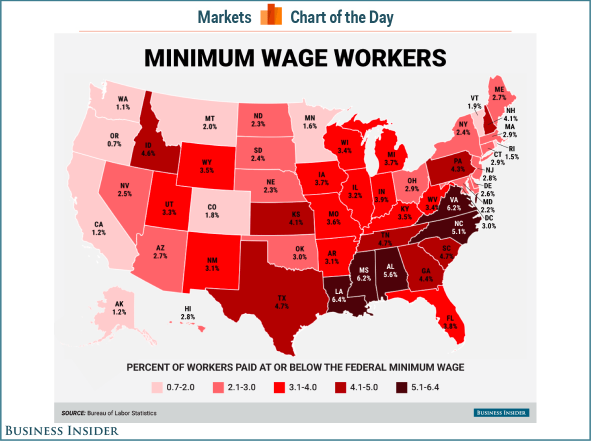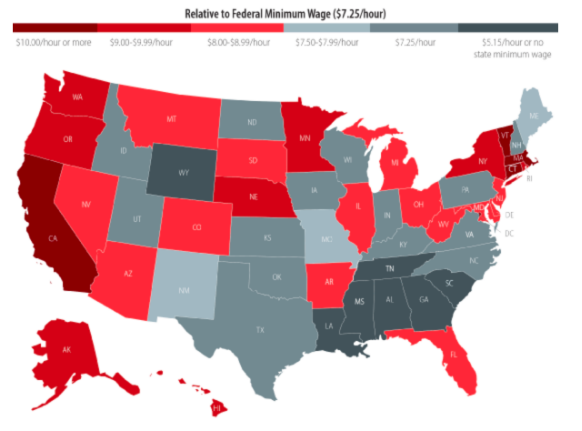In the 10 U.S. states with the highest populations, a total of 2.4 million workers lost out on $8 billion in annual earnings as a result of violations of minimum wage laws, according to a 2017 report from the Economic Policy Institute. This equates to around $3,300 annually for year-round workers, which is close to a quarter of earned wages for a minimum-wage worker.
 Image credit: Business Insider
Image credit: Business Insider
Minimum-wage workers are not the only ones who experience wage theft as a result of employers violating federal labor laws. “There are many different ways an employee may be underpaid,” according to William Tucker, a small business attorney at Gehres Law Group.
Tucker explained employees are underpaid when employers don’t provide proper payment for overtime; when employees aren’t provided with meal breaks and rest periods; when employers don’t provide required wage statements; and when workers are not paid final wages in a timely manner after leaving their jobs.
If you’re an employee and you fear you’re not paid properly, you have legal rights and should not be afraid to raise the issue with your employer or take other steps to pursue a remedy.
“Many states have strong laws against retaliation or discrimination for making an oral or written complaint for wages owed,” according to Darren Lipinsky, a senior trial attorney at Lipinsky Employment Lawyers. “Federal law also protects against such discrimination or retaliation.”
To help ensure your employee rights are being respected, here are a few key things to know about how federal labor laws work to prevent wage theft.
The Minimum Wage Can Vary Based on Where You Live and Work
Many professional workers have the option to negotiate salary when starting a job to ensure they receive a fair pay based on their skills. There are also specific rules that protect all workers, including those who don’t have a lot of leverage in the marketplace to negotiate their wage. One of those rules relates to minimum wage.
One of the most basic rights of every worker is the right to be paid at least the minimum wage. For many workers, the minimum wage is the federal minimum wage of $7.25 hourly, according to the United State’s Department of Labor.
In 2016, 701,000 workers aged 16 and over were paid the federal minimum wage, while an estimated 1.5 million workers were paid less than the federal minimum, according to the Bureau of Labor Statistics(BLS). BLS explains many of the 1.5 million workers paid under $7.25 hourly are not protected by minimum wage laws because they fall into exemptions, like rules allowing some hand-harvesters to be paid under minimum wage.
Federal labor laws also allow for tipped workers to be paid a lower minimum wage of $2.13 hourly, which is why it is so important to tip service providers an appropriate amount. However, if tipped workers don’t actually make up the difference between $2.13 and $7.25 with their tips received, their employer will have to pay more. It is the responsibility of employers to make sure they are paying the difference if tips don’t add up to at least minimum wage. However, tipped workers should track their tips to ensure they are getting paid fairly and should talk with an employer if their wages fall short.
Tipped workers aren’t the only ones subject to a different minimum wage rule than the federal requirement of $7.25 per hour. Some workers are covered by states and local laws imposing higher wages than this federal minimum.
In California, for example, employers with 25 or fewer employees must pay a minimum wage of $10.50 hourly as of 2018, and employers with more than 25 employees must pay at least $11 hourly. This chart from Kiplinger shows minimum wage in each state relative to the federal wage in 2017.
 Image credit: Kiplinger
Image credit: Kiplinger
The Rules for Overtime Pay
Hourly employees and some salaried workers (workers paid a set amount rather than an hourly wage) generally must not only be paid at least the minimum wage, but also be paid overtime once they exceed a certain number of hours of work per week.
According to the Department of Labor, employees must receive overtime pay once they have worked more than 40 hours in a workweek. A workweek does not have to match up with a calendar week, as any seven consecutive 24-hour periods can be considered a workweek.
Employees must be paid overtime at a rate equal to at least time and one-half their regular hourly wage. If a worker earns $10 per hour, this means his overtime wage would need to be at least $15 hourly ($10 * 1.5). Federal law does not require overtime just because workers are made to come to work on weekends or holidays, unless working on these days pushes the employee over the 40-hour threshold.
Some states require overtime in more situations than federal labor laws. For example, in California, employees are not just entitled to overtime if they work more than 40 hours per week. They are also entitled to overtime if they work more than eight hours in a single day or if they work for seven days in a row.
Some Workers Are Exempt From Overtime Rules
Both state and federal laws, however, exempt some workers from being entitled to overtime. Workers who may be exempt include outside sales employees, workers in computer-related occupations, executive employees, administrative employees and professional employees. The FLSA overtime pay calculator advisor allows employers and employees to input information about a position to determine if a worker is potentially exempt.
Generally, if workers make a salary of at least $455 weekly and their job duties mean they fall within one of the above-listed categories of exempt workers, an employer is not required to pay overtime, even if they work over 40 hours weekly.
Job titles alone do not make workers exempt; the key is whether the workers meet the criteria for being a professional worker, administrative employee or other exempt employee. The specific criteria vary depending on your job. For example, for a worker to be exempt based on being an executive employee:
- The worker must regularly supervise at least two other employees
- Management must be the worker’s primary obligation
- The worker must have input into the status of the employees being supervised, such as input into whether to fire or promote an employee
Unfortunately, there is a big problem with employers incorrectly classifying workers as exempt who shouldn’t be. Employers may classify workers as “professionals” and pay them a salary to avoid paying overtime the employees would receive if they were hourly workers.
If an employee is incorrectly classified as exempt and not paid overtime, that employee can take action to get back pay that is owed.
The Rules for Worker Pay
In addition to overtime rules and minimum wage rules, there are also other federal labor laws that protect employee rights. For example:
- You must be paid for all time worked. This includes time spent taking protective gear off and on, as well as all time you are required to be on the employer’s premises or on duty.
- Uniforms and other items provided by an employer aren’t wages. An employer cannot include the costs of a uniform — or other items provided primarily for the employer’s benefit — as part of wages. If an employer requires workers to pay for uniforms or other materials, the employer is in violation of labor laws if these costs cause wages to fall below the minimum. Employees can make workers purchase their own uniforms as long as doing so would not reduce their pay to below minimum wage.
- Employers cannot dock wages: An employer cannot cause a worker’s wages to fall below minimum wage by deducting losses from an employee’s wages, such as taking money from a cashier’s paycheck if the drawer is short.
Some states also require employers to pay for meal breaks or other rest periods. For example, in California, workers are entitled to 10 minutes of paid rest for every four hours worked. You can find your state rules for rest breaks on the website of the Department of Labor. Some states also require employers to provide a last paycheck right away for departing workers, but the Department of Labor indicates this is not a federal requirement.
What Can You Do to Protect Your Employee Rights if You’re Underpaid?
While there are many employee rights guaranteed under federal labor laws, these rules can be confusing. Many workers aren’t fully aware of what to do if their employer is violating the rules.
Make a Written Complaint
Lipinsky recommends submitting a complaint in writing to your human resources department or to someone with authority to handle the problem within your organization. He refers to this as “establishing proof of the complaint,” and recommends the written complaint also “document any past oral complaints of wage theft that have unsuccessfully been made.”
Document Any Attempts at Retaliation Your Employer Makes
Employers are not allowed to retaliate against you for exercising your employee rights in connection with unpaid wages. As Lipinsky explains: “Most courts have held that these laws [federal and state labor laws] protect those employees who make internal complaints, not just those employees who complain to a government agency.” If your employer takes adverse action after you make a complaint, document your employer’s actions.
File a Complaint With the Department of Labor
If the company fails to respond to an internal complaint or retaliates against a worker for making one, the next step Lipinsky recommends is to file a complaint with the state or federal Department of Labor or other appropriate agency. Both Tucker and Lipinsky indicate that state or federal labor departments can provide advice and will sometimes conduct an investigation and take enforcement action. Tucker advises going in person to the office near you to make your complaint and get help. You can enter your zip code on the Department of Labor website to find workforce services in your area.
Contacting an attorney is also an option, but Tucker warns it can sometimes be difficult to find a lawyer willing to take a case based on underpaid wages. “It will depend on how good a case the employee appears to have and the value of the case,” Tucker says. “In some instances, the case may be a good one, but the value is not high enough for an attorney to take it on.”
If your employer underpaid you by a small amount, like $100, it would not be worth an attorney’s time to take the case. Lipinsky says that working with an attorney could be “particularly useful when a company-wide practice of wage theft has negatively affected multiple employees.” An attorney could help those workers come together to make a joint complaint.
For smaller claims, Tucker suggests small claims court as an option and indicates it may be possible for an employee to collect the full amount owed in small claims court if the employee’s case has merit.
Whether you decide to talk with a lawyer, go to small claims court, reach out to a labor department or pursue some other legal remedy, the key is to know your employee rights and to stand up for yourself if your employer fails to pay you the wages that you deserve.
This article was originally published on Student Loan Hero. It is reprinted with permission.
Browse Open Jobs
Home >



